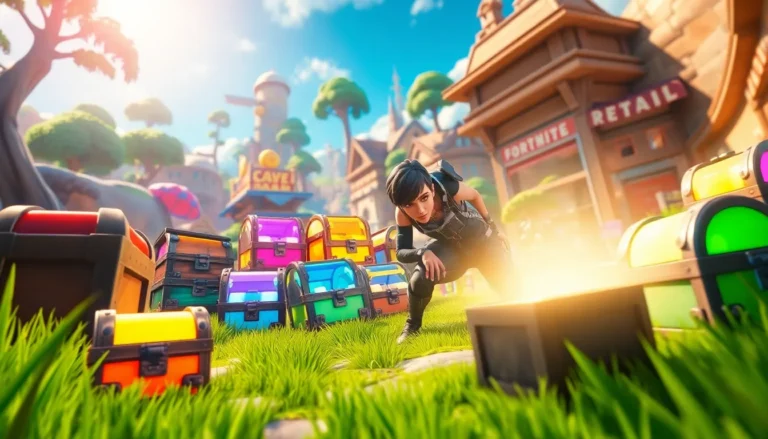Have you ever wondered about the name “Fortnite”? It’s quirky, catchy, and a conversation starter at every gaming meetup. If you’re picturing timeless battles for survival, you’re spot on. But why did the creators choose this particular name? Is it related to those goofy dances? Or is it simply a nod to the in-game action? Let’s jump into the origins, meaning, and cultural impact of this name that has taken the gaming world by storm. Spoiler alert: You won’t look at your next victory in the same way.
Table of Contents
ToggleOrigins of the Name

The name “Fortnite” has an interesting backstory, one that harkens back to a medieval concept. The term itself is derived from the old English word “fortnight,” which means a period of two weeks. But, in the realm of gaming, the title relates more directly to the idea of fortification, after all, players are often tasked with building defenses to survive the onslaught of enemies. Closely examining the project reveals that the early development phases focused heavily on building castles and defending against waves of zombies. It’s a creative blend of nostalgic reference and modern survival mechanics.
Epic Games, the company behind it all, initially released Fortnite as a co-op survival game in 2017, rather than the widely recognized battle royale format. The game’s name was fittingly chosen to reflect these early concepts of teamwork, community, and survival: elements everyone can relate to during those nail-biting two-week stints in fast-paced gameplay.
So, while the name may sound light-hearted, it actually holds a deeper meaning rooted in strategy and collaboration.
The Concept of Fortification
At the heart of Fortnite is the concept of fortification. Players have to ensure their safety by building structures that protect them from dangers lurking around every corner. Whether it’s fending off the chaos caused by other players or squashing those Menacing Zombies, the act of creating strongholds is fundamental.
The strategic element mirrors real fortification strategies in history, making it easy to draw parallels between the gaming experience and ancient practices. While players engage in battles, they often reflect on their need for shelter and defense, cementing the notion of the “fort” in Fortnite as a literal and metaphorical stronghold. It’s not just about personal safety, though. This concept of fortification builds a sense of community, focusing on cooperation among players to achieve a common goal: survival. Take a squad into the battlefield, and it becomes clear how critical teamwork is.
Connection to the Game’s Mechanics
The mechanics of Fortnite correlate intricately with its name. Building structures isn’t just an option: it’s a game changer. Players can create ramps, walls, and even elaborate fortresses in real time. This creates a dynamic gaming environment, and the fortification aspect becomes imperative for winning matches.
In many ways, the name symbolizes more than just the action of building: it encapsulates the players’ journey. One must gather resources, make strategic decisions, and outwit opponents, all while ensuring their fortress stays intact. Here, Fortnite transcends mere survival: it evolves into a test of creativity and strategy, forcing players to think on their feet. The blend of strategy, creativity, and survival encapsulated in the name showcases a range of abilities and contributions from each player, making each battle unique.
Cultural Impact and Popularity
Since its release, Fortnite has achieved unprecedented popularity, expanding its influence far beyond the gaming community. The catchy name has become synonymous with gaming culture, sparking memes, dances, and a plethora of merchandise. Who hasn’t tried to do the Floss dance or flexed with emotes while waiting for a game to load?
Statistically, Fortnite boasts millions of active users worldwide, attributing some of its success to its unique title. The name has become a badge of honor among players of all ages. Games like Fortnite have changed how people perceive gaming: it’s not just a hobby anymore: it’s a lifestyle. This cultural phenomenon inspires fan art, Halloween costumes, and even competitive tournaments, further solidifying Fortnite’s place in pop culture.
Most importantly, the name’s cleverness has drawn in players of diverse age groups, transcending traditional gaming demographics. It’s not just a game: it’s a movement.
The Evolution of Fortnite’s Branding
Fortnite has gone through several branding transformations since its inception. Initially, it started as a darker survival horror game, focusing strictly on zombie defense. Over time, it evolved into the more vibrant battlefield we know today. The naming convention reflects this change: it’s a playful nod to resilience and fun, softening the stark realities of survival mechanics.
Comparison with Other Games and Terms
When comparing Fortnite to other popular gaming titles, it stands out due to its unique branding strategy. Titles like Call of Duty or PUBG often evoke more serious tones and imagery. In contrast, Fortnite leverages bright colors and goofy dances, contributing to its approachable persona. This branding sets it apart, appealing to younger audiences and families alike.
Fan Theories and Speculations
The lore surrounding the game has generated various fan theories about both its name and its universe. Some speculate about connections to historical battles, others to mythical fortresses. This consistent dialogue hints at a community keen on dissecting every component of the game, from its title to character design, showcasing how well the name resonates with players.



